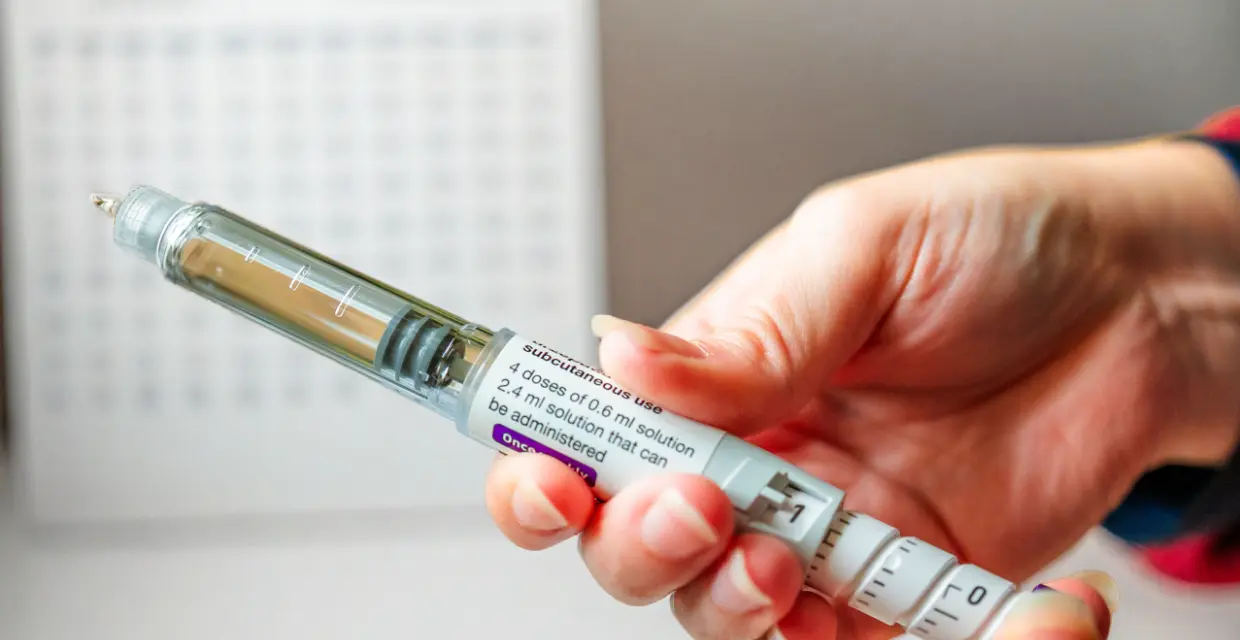Key Points
- Zepbound reaches peak blood levels within 8 to 72 hours (24 hours on average), but noticeable weight loss typically starts after 4 weeks of consistent use
- The tirzepatide medication targets gut hormone receptors that slow digestion, reduce appetite, and help regulate blood sugar levels
- Clinical trials showed 15-21% weight loss over 72 weeks, with results varying based on dosage, diet, exercise, and individual health factors
- The weekly injections must be paired with nutritious meals and physical activity
Zepbound doesn't work overnight. The medication reaches peak levels in your bloodstream within a day, but the weight loss you're hoping for unfolds over weeks and months.
This gradual timeline may surprise those who start the drug, but understanding how tirzepatide actually works in your body explains why patience pays off.
What is Zepbound?
Zepbound is an FDA-approved prescription medication for weight loss in adults with obesity or those who are overweight with at least one weight-related health condition.
It is also approved to treat moderate-to-severe obstructive sleep apnea in overweight adults.
The active ingredient in Zepbound is tirzepatide.
You might have heard of tirzepatide under another name, Mounjaro. While both medications contain the same active ingredient, Mounjaro is for managing type 2 diabetes, while Zepbound is specifically approved for weight loss.
How does Zepbound work?
Zepbound targets two hormone receptors in your body: GLP-1 and GIP. These are naturally occurring gut hormones that your body produces after eating.
Here's what happens when you take Zepbound:
- Your stomach empties more slowly, which means you feel full longer after meals. This natural feeling of fullness helps you eat less without feeling deprived.
- Your appetite decreases, and food cravings become less intense. Many people describe this as a quieting of "food noise" in their minds.
- Your pancreas releases more insulin when needed, which helps regulate blood sugar levels. Better blood sugar control can reduce energy crashes and cravings.
- Your liver produces less new glucose, supporting healthy blood sugar levels.
Zepbound is designed to work with lifestyle changes like a balanced diet and staying physically active.
How long does it take for Zepbound to work?
The medication activates in your system quickly, but results appear gradually over a couple of months.
What happens in the first 24 hours after taking Zepbound?
After you inject Zepbound under your skin, it takes about 24 hours on average for the medication to reach its peak level in your bloodstream. This timing can vary between 8 hours and up to 3 days, depending on each individual.
Some people may notice changes in their appetite within the first few days. You might find yourself satisfied sooner during meals or thinking about food less often.
More noticeable changes may occur after 4 weeks of taking Zepbound.
What happens in the first month of taking Zepbound?
Your doctor will start you on the lowest dose (2.5 mg) during this initial month. This starter dose gives your body time to adjust to the medication while minimizing potential side effects.
After 4 weeks, you may notice some initial weight loss. It takes about a month for Zepbound to reach steady levels in your bloodstream. This is the point where the medication begins working at full capacity.
If the scale hasn't budged much yet, don't be discouraged. Your body is still adapting to the medication, and the metabolic changes that drive weight loss are just beginning to take hold. "As your body adjusts, your healthcare provider will gradually ramp up your dosage," notes Gia Eapen, MD.
Long-term weight loss results on Zepbound
In the long term, you may see significant weight loss results on Zepbound.
In clinical trials, participants achieved this 15-21% reduction in about a year and a half (72 weeks). For example, if you weighed 200 pounds at the start, this would mean losing 30-40 pounds over the course of treatment.
Factors that can impact weight loss on Zepbound
Not everyone loses weight at the same pace on Zepbound. Several factors influence your individual results.
Dosage
Your dosage can impact weight loss on Zepbound. One study showed that people using the highest Zepbound dose (15 mg) lost more weight than those using lower doses (5 mg and 10 mg).
In the study, the average weight loss was about 15% for 5 mg, 19.5% for 10 mg, and 20.9% for 15 mg in adults with obesity or who are overweight without type 2 diabetes.
However, higher doses may also come with a greater likelihood of side effects.
“Your healthcare provider will work with you to find the right balance between effectiveness and tolerability,” explains Eapen, MD. “The goal isn't necessarily to reach the highest dose. The goal is to find the dose that works for your body while managing any side effects you experience.”
Diet and nutrition
Zepbound is most effective when balanced with a nutritious diet. Your diet plays an important role in weight loss, even on Zepbound.
“Focus on protein-rich foods to preserve muscle mass, a variety of whole vegetables for vitamins and minerals, and adequate hydration throughout the day,” explains Rita Faycurry, RD, Registered Dietitian. “Avoid ultra-processed foods, high-fat fried and greasy foods, sugary drinks, and alcohol.”
A registered dietitian can ensure you're getting adequate nutrition despite a reduced appetite and side effects from the medication.
Physical activity
Exercise is also recommended when taking Zepbound. The US CDC recommends at least 150 minutes of moderate physical activity per week. That breaks down to just 30 minutes, five days a week.
This can be a mixture of cardio and strength training. Cardio exercises like walking, swimming, cycling, or dancing help burn calories and improve heart health. Strength training with weights or resistance bands helps preserve muscle mass as you lose weight and improves metabolism.
As you lose weight on Zepbound, you might find physical activity becomes easier and more enjoyable. Many people discover a positive cycle where losing weight makes exercise easier, which supports more weight loss.
Sticking with the plan
Staying consistent with your weekly Zepbound injections is important to experience results. The medication needs to maintain steady levels in your body to be effective.
Missing doses can slow progress. If you struggle to remember your weekly injection, try setting a phone reminder or choosing a specific day that fits easily into your routine.
Zepbound side effects
The most common side effects include nausea, diarrhea, vomiting, constipation, and stomach pain. These digestive symptoms typically improve as your body adjusts.
However, persistent side effects may impact your weight loss on Zepbound. Your healthcare provider might have to lower your dose to manage side effects and sometimes even discontinue treatment.
“Work closely with your healthcare provider to manage side effects when on Zepbound,” says Eapen, MD.
Individual factors
Certain health conditions and hormonal conditions may make it harder to lose weight on Zepbound. If you have type 2 diabetes or other health conditions, be patient with your progress. You're still benefiting from the medication, even if results come more slowly.
Talk to your healthcare provider to understand what you can expect or if you have concerns about your weight loss on Zepbound.
Final thoughts
Patience is key when starting Zepbound (tirzepatide). You may begin noticing changes after 4 weeks. However, more significant weight loss may occur over a longer period (months of consistent use).
The medication works best as part of a comprehensive approach combining healthy eating habits and regular physical activity.
Stay in close communication with your healthcare provider throughout your treatment. They can adjust your dose, help manage side effects, and provide ongoing support.
Frequently asked questions (FAQs)
When does Zepbound peak in your system?
Zepbound reaches peak levels in the blood 8 to 72 hours after injection, with 24 hours being average.
How to flush Zepbound out of your system?
You cannot speed up the elimination process. The body naturally breaks down and removes Zepbound through urine and feces based on the medication's half-life. It usually takes 30 days to get Zepbound out of your system.
How long does it take for Zepbound to be out of your system?
With a half-life of approximately 5 days, it takes about 30 days after your last dose for complete elimination. It takes 5-6 half-lives for the drug to clear from the system.
How long do the effects of Zepbound last?
It takes 4 to 5 weeks of regular use for the medication to build up and reach its full appetite-reducing effects. Once you stop, those effects continue for about 30 days as the medicine gradually leaves your body.
When people stop taking the medication, their appetite typically returns, and they may regain weight. In a study, people who stopped Zepbound after 9 months (36 weeks) regained 14% of their lost weight.
Boost weight loss on Zepbound. Find a registered dietitian covered by insurance for personalized support.
The views expressed by authors and contributors of such content are not endorsed or approved by Fay and are intended for informational purposes only. The content is reviewed by Fay only to confirm educational value and audience interest. You are encouraged to discuss any questions that you may have about your health with a healthcare provider.
Sources
- ZEPBOUND™ (tirzepatide) Injection, for subcutaneous use (2022)
https://www.accessdata.fda.gov/drugsatfda_docs/label/2023/217806s000lbl.pdf - FDA Approves First Medication for Obstructive Sleep Apnea (December 20th, 2024)
https://www.fda.gov/news-events/press-announcements/fda-approves-first-medication-obstructive-sleep-apnea - MOUNJAROTM (tirzepatide) Injection, for subcutaneous use. Initial U.S. Approval: 2022
https://www.accessdata.fda.gov/drugsatfda_docs/label/2022/215866s000lbl.pdf - Tirzepatide Once Weekly for the Treatment of Obesity (June 04, 2022)
https://www.nejm.org/doi/full/10.1056/NEJMoa2206038 - Aerobic Exercise and Weight Loss in Adults: A Systematic Review and Dose-Response Meta Analysis
https://jamanetwork.com/journals/jamanetworkopen/fullarticle/2828487 - Update on the Effects of Physical Activity on Insulin Sensitivity in Humans (March 01, 2017)
https://bmjopensem.bmj.com/content/2/1/e000143 - Increasing Muscle Mass to Improve Metabolism (April 01, 2013)
https://pmc.ncbi.nlm.nih.gov/articles/PMC3661116/ - US CDC Adult Activity: An Overview (December 20, 2023)
https://www.cdc.gov/physical-activity-basics/guidelines/adults.html - Continued Treatment With Tirzepatide for Maintenance of Weight Reduction in Adults With Obesity (December 11, 2023)
https://jamanetwork.com/journals/jama/fullarticle/2812936











